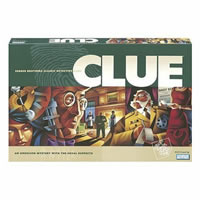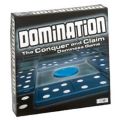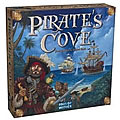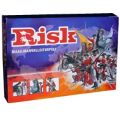

If you are a detective, or a real mystery solver at heart, Clue is the board game for you. Players wander around the Clue game board mansion trying to solve the mystery of who was killed, by which weapon, and in what room. Clue cards are given to each player but this is still not enough to solve the mystery. Clue board game players begin making their accusations on who, where, and with what they think the murder took place. If another player can prove them wrong by showing them one of his clue cards, the game continues and intensifies as more and more clues are given.
Clue is an excellent board game for strategy, reasoning, and thinking. There still is a factor of luck as players must move about the board by rolling the die. If it's cold and windy outside or dark and damp, it sounds like perfect weather to play a great game of Clue. Was it Professor Plum, with the knife, in the Ball Room.

Clue is a board game in which you must be the first to solve the mystery of a murder by correctly identifying who did the murder, where it was done, and how they did it.

Perparation: Shuffle all 21 cards in their corresponding groups (suspect, weapon, and rooms) and randomly pick a card from each group with out showing anybody including you. A total of three cards are then inserted into the envelope marked "Solution Cards" and placed over the spot marked with an "X." All remaining cards are then shuffled together and mixed. Deal one card clockwise to each player until all cards have been dealt. Some players may have more cards than others and is important to not let anyone see your cards.
To finish setting up the Clue board game, as mentioned in the rules, position all six character playing piece on the starting squares marked with their names. This is done whether you have six players or not. Randomly place each weapon in a different room. The suspect token located closet to each player is the token they will use throughout the game.
Game Play: Instructions for who starts the game are whoever has Miss Scarlet (red) rolls the die and is the first to move. Clue game play is then continued to the player left of Miss Scarlet.
Players move their suspect token across the yellow squares the amount shown on the die in their roll. You may move your token forwards, backwards, or crosswise all in the same turn. Moving your token diagonally is against the Clue rules. You cannot move your token to a particular space twice in the same turn nor occupy or move through the same square as another player. This rule does not apply to rooms as multiple players and weapons may occupy the same room.
The Clue board game rules state that there are three ways to enter or exit a room: 1) entering through the doorway by moving your token the number shown on the die across the yellow squares, 2) you may use the Secret Passages by jumping corner to corner across the board without using the die, 3) or your token may be placed into a room by another player when suggestions are being made to solve the murder mystery. It is against Clue rules to enter and exit a room during the same turn; entering a room ends your turn. You do not need to throw the exact number on the die to enter a room. Doors or each room do not count as a square.
Once a player enters a room, they are then eligible to make a "suggestion" on who committed the Clue game murder. This is done when the player names a Suspect, a Weapon, and the Room that they are currently in ("I suggest that the crime was committed in the Library, by Prof. Plum with the Rope"). If the named suspect is not currently in the room where the suggestion was made they are brought into the room along with the suggested weapon. Keep in mind that all characters are considered as suspects in the crime and not only those who are being player. Forfeiting or not taking your turn is against the rules; all players must roll the die. After entering a room and making a suggestions, you may not make another suggestions until entering another room or using at least two turns (leaving and then re-entering the same room).
Secret Passages can be used in any corner room on the player's turn without rolling the die. The player then announces that he has used the secret passage and may make a Suggestion.
After a Suggestion has been made, if possible, players must try to prove the Suggestion to be false. This is done by moving left to the player making the accusation. If that player has one of the cards that were used in the alleged crime, he then secretly shows the player making the suggestion. Clue rules state that only one card is shown to the other player and that it is done secretly with out others seeing which card it is. It is not against the rules, however, to deliberately make a Suggestion naming one or two cards that you hold in your own hand to mislead other players or to narrow your search for one specific suspect, room, or weapon. If the player to the left cannot prove the suggestion wrong, then the next player to the left attempts to prove it wrong. All cards shown prove that that card is not in the envelope and should be noted on your Detective Pad. Once a player has proven the Suggestion wrong, the next payer in the playing order takes their turn. If no one disproves the Suggestion the player then may either pass their turn or make an Accusation.
When an Accusation is made, the player (on their turn) states that an Accusation is being made and states the three cards that he thinks committed the murder. They then carefully look at the cards inside the envelope making sure that no one else sees the cards. Unlike the previously stated rules, a player may make an accusation whether or not their token is in the room they mention. If the 3 cards named are the cards in the envelope, they are placed face up on the Clue board and that player is the winner. If the accusation is wrong, the cards are secretly placed back into the envelope and that player can no longer win nor make any suggestions/accusations. They stay in the game only to prove other's suggestions wrong with the cards they hold in their hands. Once a player has accused the wrong cards, blocking the doorways to rooms is against the rules and they must be moved into the nearest room. One Accusation per player per game is permitted.
There are no strict Clue rules that explain how the Detective Note Pads should be used but it is suggested that you check off or write the initials of the player who has each specific card.
Please keep in mind that the official Clue PDF rules listed below could be different depending on the version you have. They should be an exact copy of what came in your original packaging. Download them to view now or print them for later use.
Share with us your comments, funny stories, tips, advice, strategies, creative ways to play, questions about playing, problems with the directions, etc. All submissions will be reviewed within 24 hours.
Jon says:
linguistics problem: "It is against Clue rules to enter and exit a room during the same turn" the issues are "a room" and "enter and exit". leaving multiple interpretations. - should it be "enter then exit" - should it be "the same room" or should it be "any two rooms"
There is a clue card that says “All players rush to the room of your choice†does this mean that I choose where all the players go or that all the players go where they want to go?
After making a suggestion do you still have to roll the dice? As in is always mandatory to roll the dice?
There is a clue card that says “All players rush to the room of your choice†does this mean that I choose where all the players go or that all the players go where they want to go?
During gameplay if I draw a clue card which requests name a player that you want revealed. Can I say Mr Green even though I am holding Mr Green as a way to throw other players off (as a strategy?)
If you roll a 7 and that gets you to the open door outside a room, can you just go in? Or does your roll need to include one step to land in the room?
If you are playing the board game Clue and you get the clue card that says “All players rush to the room to the room of your choice†does the person who picked the card choose where you go or do you go where you choose?
What happens when a player make a suggestion, and one of the suggestions is on the table faced up, does that count or does the player who faced that card up, has to show from hand if they have one of the suggestions
What's the proper rule of moving around in the boxes if it's only clockwise, if I'm FOUR boxes away from a door do I have to roll a four? Or if a dice rolls 9 I have complete 9 steps?
What would happen if a player started their turn in a room without a secret passage but all of the doors had a player directly outside of them? They can't leave the room because they're not allowed to move through another player's square. However, it also says that forfeiting or not taking your turn is against the rules. I know this is very unlikely but which rule would take precedence?
"Terry says: 08-05-2018 It's been a month, and I got no answer to my question regarding a player goofing and not showing a card that was asked for. So again: If the first player says "No help," a second player does have a clue and shows it, then the first player says, "Oh! I do have one of those clues!" what's the procedure? Does she have to show her clue card even though the next player showed hers? Anybody got an answer? Thanks. Terry" That player has cheated and is eliminated from the game. Whether or not you choose to execute him is entirely at your discretion.
When in the pool making your final guess can a the rumor stays unanswered card be used by another player?
It's been a month, and I got no answer to my question regarding a player goofing and not showing a card that was asked for. So again: If the first player says "No help," a second player does have a clue and shows it, then the first player says, "Oh! I do have one of those clues!" what's the procedure? Does she have to show her clue card even though the next player showed hers? Anybody got an answer? Thanks. Terry
It's a question. What's the play if, after you've made a suggestion, the first person to respond says she has no clues you've suggested, the next person then shows you a clue, then the first person says, "Oh, I messed up! I do have one of your suggestion clues." What happens then? Does responder #1 still show you the card she missed? Or does the card shown by responder #2 suffice? Is responder #1 penalized in any way, even if the error was unintentional? My group has continual arguments about this. Thanks!
I was playing with my aunt and she said doors count as spaces. I saw where it said doors do not count as spaces. She is still confused. Can someone explain this for her?
My son states that if a player uses a card that is already showing on the "Face Up" layout then the player asking the question already has an answer and therefore, the person to the left does not have to show a card. That is not how I have interpreted the rules. What is correct?
Is it cheating if no one has the information and the least person doesn't either and the last person shows the person the back of a card and doesn't say they have nothing
Great game, I really love tricking my siblings into believing one thing while I secretly am getting a lot of info
Q: If my token has been moved to a room because someone moved it there to be able to make a suggestion can I move back to the space I was before or I have to leave the room and keep playing like if I entered a room?? Pls answer!
Luke, it is stated clearly in the rules. "After entering a room and making a suggestions, you may not make another suggestions until entering another room or using at least two turns (leaving and then re-entering the same room)." So you could choose to stay in the ballroom and make a suggestion if you'd been hauled into the ballroom because your character had been suggested by another player in the ballroom, because you'd hadn't yet made a suggestion there. In you example, where you'd already made a suggestion there, you'd have to leave.
When one makes a suggestion on, say, a weapon, it is not possible for another player to "secretly show" that weapon card to the player making the suggestion in order to demonstrate that his/her suggestion is wrong. The remaining player(s) would have to be blind in order not to see that. I played this game back in the late 50s and early 60s and I don't remember some of this stuff such as "secretly showing" a card to another player. The recent version we bought has cards representing the weapons rather than small pieces that look like weapons. A card that looks like a gun just doesn't have the same impact as a plastic or metal piece that looks like a gun. I think we need to buy a bigger version, but availability may be a problem in our town. I know, I know; order it off the Internet. But, even if we played it wrong, Grampa and Grandson and I still had fun. Incidentally, I won the first round.
Is a player allowed to continuously stay in a room without rolling the dice? Say I entered the ballroom on one turn, made a suggestion and was wrong. Then when it came around to me again, I did not roll, I stayed in the ballroom, and made another suggestion. And so on, and so on. We needed clarification if that is allowed because it isn't clearly stated in the rules
Is it cheating if someone sneaks a look at someone else's clue sheet? I had a huge debate about this. I think it's cheating.
Q: "Can a player make an accusation that he knows is false because he has one or two of the cards he includes in the accusation?" A: Only one accusation can be made per person in the game. So if you're wrong you're out of the game. However if you want to make a suggestion, it is alright if you use some of the cards in your hand to throw other players off. For example, you might have Mrs. White and the Dining Room in your hand. Then you make the suggestion that it was Mrs. White with the candlestick in the dinging room. Therefore you already know it's not the two you have in your hand and you're really just trying to figure out the weapon.
Kevin, the intrigue card applies only to the person who has it. It does not cover the other players to the left because it's not their card.
One of the intrigue cards says "the rumor stays unanswered". We had a huge debate over whether the card applies to ONLY to the person with the card or to all players seated to the left of the player with the card. I can't find an answer in the rules. Anyone know where to find the answer?
Can a player make an accusation that he knows is false because he has one or two of the cards he includes in the accusation?
Can a player make an accusation that he knows is false because he has one or two of the cards he includes in the accusation?
Hey there Steve T if you would just read the rules like everyone else you would find that anyone can can make an accusation about a room they are not in.
I have a question about an interpretation of a rule in the newer version of Clue. Prof. Plum has as his special power the ability to make an accusation from "a room he is not in." Controversy has ensued as to whether this means the prof. plum player can use this power to make an accusation from anywhere on the board, including while located in the areas between rooms, or if prof. plum still has to be in a room to make an accusation. Being in the area between rooms would be making an accusation from a room he is not in, but some say that the intention is that prof. plum still has to be in a room to accuse just not the room he is making the accusation about? Thoughts?
I love this game. It reminds me of cold winter days when all the family would get together and play Clue and drink lots of hot chocolate. Great times in life! Thanks for this site so we can all reminisce on our past memories!
Here are some other games you might like to play at your next get together. Learning how to play new games can feel daunting at first but once you get the hang of it, it can be really fun to try out new games. You can also use our search feature at the top of the page to search for a specific criteria that might interest you. Who knows - you might just find your next favorite game.

Domination

Pirate's Cove

Risk

Nightlancer